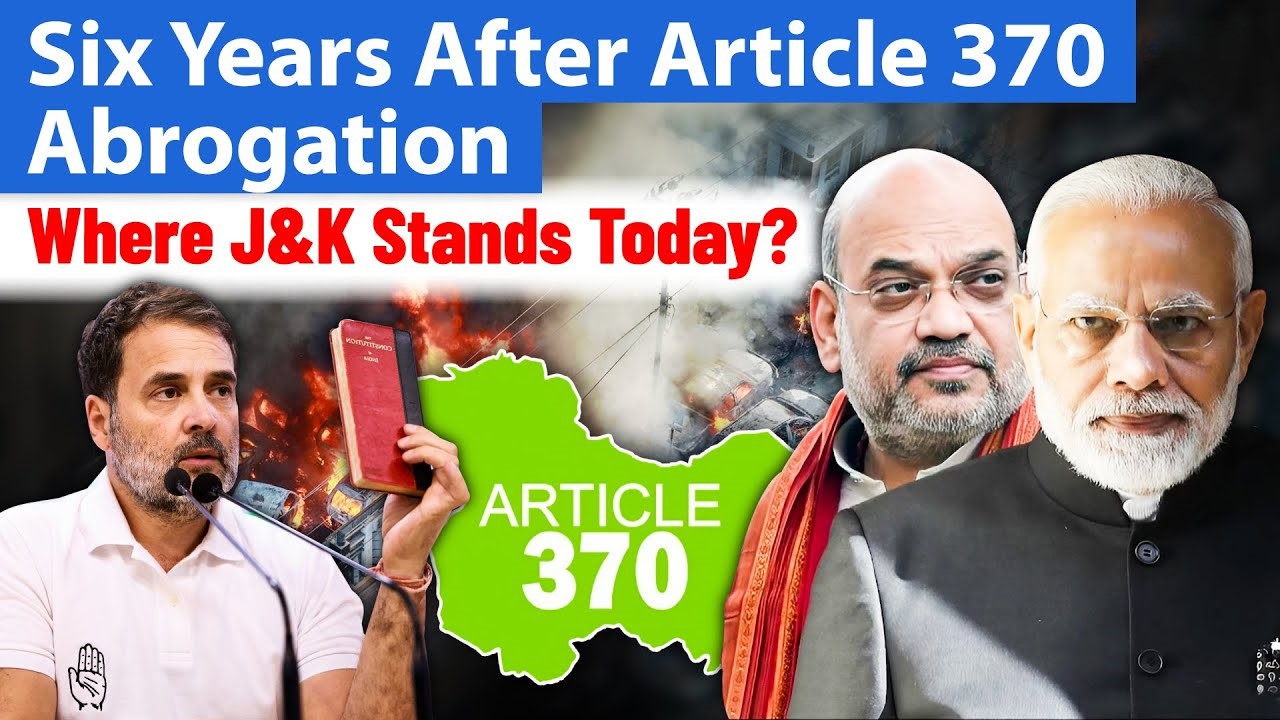J&K at a Crossroads: Progress, Pain, and the Politics of Change
By: Javid Amin | Srinagar | August 6, 2025
Six years after the Indian government revoked Article 370 and 35A, stripping Jammu & Kashmir of its special constitutional status and bifurcating it into two Union Territories, the region continues to stand at a complex political and emotional crossroads.
What was touted in Delhi as a decisive step toward “integration and development” remains, for many on the ground, an open wound—stitched together by promises, but still aching with loss, uncertainty, and contested definitions of normalcy.
August 2019: A Silence That Roared
At the stroke of dawn on August 5, 2019, Kashmir didn’t wake up—it went quiet. Phones fell silent. Internet vanished. Roads were sealed. Soldiers appeared at every intersection.
“We couldn’t tell if our relatives were alive or dead. It was like the Valley had vanished,” recalls Farhat, a teacher from Anantnag, whose family was separated for 11 days during the blackout.
Hospitals couldn’t be reached. Pregnant women walked miles. Dialysis patients missed treatments. Petrol stations ran dry. And the only news was the absence of any.
“A death in our family went un-mourned. We weren’t allowed to gather or grieve,” says Yousuf Ahmad, a retired government employee from Baramulla. “Even funerals felt illegal.”
That day marked not just the abrogation of constitutional autonomy, but a psychological rupture that still reverberates.
Governance: Elections Without Power?
The return of democracy in 2024 brought Omar Abdullah back as Chief Minister, after a long spell of central rule. But many say his role remains symbolic.
“Nothing will happen tomorrow,” Omar tweeted on the eve of the sixth anniversary, brushing aside speculations about the restoration of statehood or any major announcement.
He clarified he had no inside information and based his statement on “gut feeling.” Still, he remained cautiously optimistic about positive developments during the ongoing Monsoon Session of Parliament.
The Supreme Court, while upholding the constitutional changes, directed the Centre to restore statehood “at the earliest.” A hearing on this matter is set for August 8—just days after the anniversary.
Politics of Symbolism: A Date of Consequence
August 5 has morphed into more than just an anniversary—it is now a political milestone, loaded with symbolism for both the ruling BJP and those resisting its Kashmir policy.
While no major public events were held by the BJP this year, back-to-back closed-door meetings between PM Modi, Amit Shah, and the President in Delhi stirred speculation. Could statehood be on the cards? A legal tweak? A fresh delimitation?
The BJP’s strategic silence is telling. As is its history with this date:
-
2019: Abrogation of Article 370
-
2020: Bhoomi Pujan of the Ram Mandir
-
2025: Quiet consultations, possibly setting the stage for future reforms
🛕 “This is not just a date. It’s choreography,” said a Srinagar-based political analyst. “What isn’t said often speaks louder.”
Divided Political Voices
While Omar Abdullah struck a calm, composed tone, Mehbooba Mufti of the PDP was sharp and unrelenting.
“No real development is visible on the ground,” she said in a public address. “They’re importing slums and poverty into Kashmir under the guise of housing schemes.”
She questioned the claim of allotting land to 1.99 lakh landless people, pointing out that only 19,000 families were ever officially counted as homeless.
The administration, in response, cited SECC 2011 and Awaas Plus data to justify the numbers, asserting that no outsiders were being granted land.
🕯️ “Our silence today is a protest,” Mehbooba declared, urging people to turn off lights for 15 minutes as a symbolic gesture of mourning.
Economy: A Mirage of Progress?
Six years in, the economic picture remains paradoxical.
-
₹84,000 crore worth of investment proposals have been received, but only ₹2,500 crore has actually materialized.
-
Real GSDP growth has fallen from 6.91% in 2019 to 3.97%, below the national average.
-
Youth unemployment remains a staggering 30%+, double the national rate.
-
Internal debt has nearly doubled, and liabilities now exceed 60% of GSDP.
“People took loans expecting a boom. Instead, many are stuck in a debt trap,” said Irfan, a former entrepreneur in Pulwama whose start-up failed last year. “We traded autonomy for uncertainty.”
Tourism: The Silver Lining?
One area of genuine growth is tourism.
-
21 million tourists visited J&K in 2023, boosting GDP and generating jobs.
-
G20 events brought global spotlight and infrastructural upgrades.
-
Film tourism campaigns like “Back to Paradise” are attracting Bollywood and international crews.
Still, some locals feel the benefits are lopsided.
“Hotels are full, but so are we—with debt,” says Tajamul, a houseboat owner in Dal Lake. “Without land rights, tourism alone can’t feed us.”
Civil Liberties & Control
Despite the economic push, press freedom and civil liberties remain tightly controlled.
-
Journalists operate under surveillance.
-
Civil society groups report being denied registration, funds, or space.
-
Activists are still detained under PSA or UAPA, often without trial.
Legal integration brought RTI, RTE, IPC, and diluted land laws, but the emotional disintegration—especially in the Valley—remains unresolved.
Security: Calm or Controlled?
Violence has declined sharply since 2019:
-
Stone-pelting is rare.
-
Shutdown calls have disappeared.
-
Terror incidents fell from 153 (2019) to 46 (2023).
But the April 2025 Pahalgam attack, in which 26 civilians died, served as a bloody reminder that militancy hasn’t vanished—it has merely mutated.
The army’s Operation Sindoor neutralized the attackers, but tensions remain high.
Bottom-Line: A Region Still in Transition
Jammu & Kashmir today is a tale of contrasts—rail lines and roads stretch farther than ever, but political alienation runs just as deep. Development is visible, but democracy feels deferred. Tourism booms, yet identity crises persist.
“It’s like we’re being told to forget who we were,” said Nazir, a university student in Sopore. “But how do you build a future if you’re denied your past?”
Six years on, Article 370 may be history. But for many Kashmiris, healing remains a future tense.



